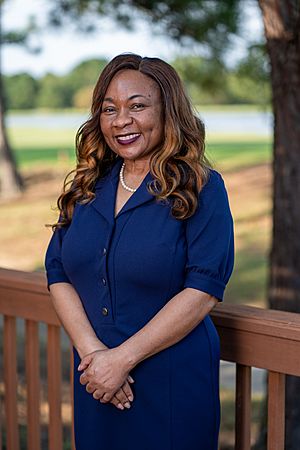Catherine Coleman Flowers facts for kids
Quick facts for kids
Catherine Coleman Flowers
|
|
|---|---|

Flowers in 2020
|
|
| Born | 1958 (age 67–68) Birmingham, Alabama, U.S.
|
| Alma mater | Cameron University University of Nebraska at Kearney |
| Employer | The Center for Rural Enterprise and Environmental Justice |
| Known for | Environmental activism |
| Awards | MacArthur Fellow (2020) |
Catherine Coleman Flowers, born in 1958, is an American researcher and writer. She founded the Center for Rural Enterprise and Environmental Justice. In 2020, she received a special award called the MacArthur Fellow. Her book, Waste: One Woman's Fight Against America's Dirty Secret, talks about how people are working for environmental fairness in the countryside. She is well-known for showing the problems with sewage systems in places like Lowndes County, Alabama.
Contents
Early Life and Inspiration
Flowers was born in Birmingham, Alabama in 1958. She was the oldest of five children. Her father, J.C. Coleman, was a salesman and a military veteran. Her mother, Mattie Coleman, was a teacher's aide. In 1968, her family moved to Lowndes County.
Her parents were important community leaders during the American Civil Rights Movement. They inspired Flowers to care about the environment. She grew up understanding the history of Lowndes County, including its past struggles. Her family on her father's side were enslaved people in Lowndes County in the 1800s.
When Flowers was a teenager, her mother had a medical procedure without her full agreement. At 16, Flowers became a Robert Kennedy Fellow. This meant she got involved in important issues at her high school and in her community. She helped show problems at her high school, which was still separated by race. Her efforts led to changes, including the resignation of the principal and school superintendent. These experiences helped shape her activism as an adult.
Education and Early Work
Flowers started college at Alabama State University. Later, she joined the Air National Guard and the Air Force. She served for three years before leaving due to difficult experiences. After moving to Oklahoma, she earned her bachelor's degree from Cameron University in 1986.
She began her career as a geography teacher in Detroit. She also worked as an advocate for civil rights. She became the executive director of the National Voting Rights Museum. As she became more involved in activism, she took on other roles. This included leading the NAACP Voter Empowerment Program. She later went back to school and earned a master's degree in history from the University of Nebraska at Kearney.
Working for Change
In 2001, Flowers moved back to Alabama. She focused on helping the economy in Lowndes County. About three-quarters of the people in Lowndes County are Black. By 2002, she saw that the local sanitation systems were failing. People were being arrested for not paying for septic systems. Others who paid for systems were not getting proper service. Flowers was surprised that the government was targeting poor people instead of big companies that polluted.
This experience made her focus on environmental justice and climate issues. She got approval from the United States Environmental Protection Agency (EPA). This allowed her to create a plan to fix the raw sewage problems in Lowndes County.
In 2011, Flowers worked with a UN Special Rapporteur. They studied poverty and its effects on basic services in Lowndes County. Since 2015, Flowers has been a Senior Fellow at the Center for Earth Ethics. In 2017, she was a Practitioner in Residence at Duke University. She founded the Center for Rural Enterprise and Environmental Justice in 2019.
Flowers and the Columbia Law School Human Rights Institute looked into how unfair systems affect access to clean water and sanitation. She found that excluded, poor rural communities often had dirty water and bad sanitation. This can lead to the spread of intestinal infections, like hookworm.
In 2019, Flowers and JoAnn Kamuf Ward published a report. It was called Flushed and Forgotten: Sanitation and Wastewater in Rural Communities in the United States. Flowers wrote in the report, "In Lowndes County, Alabama, and many of the surrounding areas, lack of basic amenities that many Americans take for granted is a way of life." The report suggested ways to improve accountability. It also said that affected communities should be part of any decision-making. And it stressed that everyone should have access to good sanitation, based on fairness.
In 2019, she spoke to the United States Congress. She asked the government to address diseases linked to poverty in the United States. She was also appointed to the Joe Biden Task Force on Climate Change. This group was led by Alexandria Ocasio-Cortez. Flowers was the only Black member of the task force. In 2021, she became a member of the White House Environmental Justice Advisory Council.
Personal Life
Flowers is married to Thurgood Bunche Flowers. They have one daughter. She grew up following the Missionary Baptist faith.
Awards and Honors
- 2004 Interreligious and International Peace Council's Crown of Peace Award
- 2016 Grist 50
- 2017 Women Who Shape the State
- 2020 River Rally River Hero
- 2020 The Jean and Leslie Douglas Pearl Award
- 2020 Studs and Ida Terkel Prize
- 2020 Greenmatters Black Climate Scientists and Scholars Changing the World
- 2020 MacArthur Fellow
 | Delilah Pierce |
 | Gordon Parks |
 | Augusta Savage |
 | Charles Ethan Porter |

